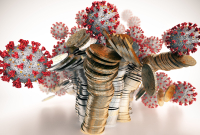Support strong Canadian climate journalism for 2025
Prime Minister Justin Trudeau is calling for a co-ordinated global response to ensure a smooth economic recovery from the COVID-19 pandemic.
At a virtual meeting organized by the United Nations, Trudeau said Canada can’t defeat the novel coronavirus and rebuild its economy unless all countries have the resources to recover.
"We need to make sure at the same time as we're focused on the health (of people), we are also focused on the health of the global economy," Trudeau said.
"That means taking real action by leading countries around the world to recognize that it isn't just in the global interest but in their own interest to ensure a more equitable global recovery."
UN Secretary-General António Guterres said the lack of action to support vulnerable middle-income countries affected by the crisis presents a risk of spiralling into the worst recession since the Great Depression.
The effect will be greatest on the poorest people in the most vulnerable countries, but it will also affect people in high-income countries.
"There have been credible forecasts of losses of global output in the trillions of dollars," he said.
"We are already in the worst global recession in 90 years."
The meeting followed a series of sessions held last year to mobilize efforts for economic recovery from the pandemic.
Guterres said the world is on the verge of a debt crisis, as six countries have already defaulted and one-third of emerging-market economies are at high risk of fiscal crisis.
"Many developing countries face financing constraints that mean they cannot invest in recovery and resilience, nor can they access the vaccines that provide the fastest route out of the pandemic," he said.
He said developing countries urgently need access to additional liquidity to respond to the pandemic and to invest in a sustainable and inclusive recovery.
Trudeau said Canada, along with Jamaica and the UN Secretary-General, have been leading the discussions on ensuring a more equitable and just economic recovery.
He said countries need access to cash so they can support their citizens and small businesses to get through the crisis.
"It is part of our own domestic self interest to see countries around the world succeed through (the pandemic), so that we can all get back to the global economy as best as we possibly can," Trudeau said.
He added there are middle-income countries that are extremely vulnerable, either to the fallout from this pandemic because of their reliance on tourism, for example, or generally due to the crisis of climate change.
"We need to ensure that the international financial institutions are ready to support them."
In a new policy brief issued Monday, the Secretary-General said that while many steps taken to date have been significant, they have not been sufficient to help restore economic health.
Risks remain high for more countries to tip into a debt crisis, especially if the COVID-19 shock is more protracted and deeper than forecast.
Guterres said the pandemic has already resulted in more than 2.7 million deaths and over 125 million confirmed COVID-19 cases worldwide, moving beyond a health crisis to become a global development emergency.
"Unless we take decisive action on debt and liquidity, we risk another ‘lost decade’ for many developing countries."
This report by The Canadian Press was first published March 29, 2021.
This story was produced with the financial assistance of the Facebook and Canadian Press News Fellowship.





Comments